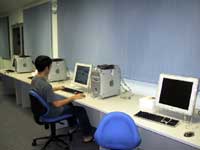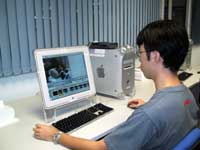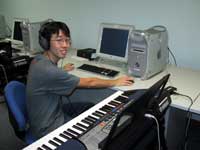Cyberarts StudioThe first Cyberarts facility at NUS (and in South East Asia), the CCRI Cyberarts Studio provides a truly multi-disciplinary setting where scientists, artists, academics and students come together to create and collaborate. The idea was first initiated by Dean of Scholars Programme, Shaw Professor of English and Digital Culture, George Paul Landow, to build an innovative teaching facility that houses not only classes, but also serves as a space that promotes creativity, innovation and freedom of expression.
The main feature of the studio is the space itself and how students feel inside it. A new concept for innovative learning, latest technology and equipment in themselves are not the center of the learning process, but a subtle and carefully chosen component that brings together a team of creators where aesthetics of technology promotes students' minds to think differently about cutting-edge research, and inspires creations, new ideas and interdisciplinary collaborations. As such, the studio serves as an institutional support for multi-disciplinary research for all. That said, the studio does include some of the best equipment available, including 22 Mactintosh G4 computers with 17" flat screen monitors, 4 of which are dedicated for digital video editing with Final Cut Pro, and 10 are hooked up with Logic Audio Platinum and Yamaha PSR340 or PSR350 synthesizers for music and sound manipulation. All of the computers are loaded with standard digital art programs such as Photoshop, Freehand, Dreamweaver, Storyspace, BBEdit, Flash, and LightWave for 3D modeling. In an effort to encourage interdisciplinary collaboration, two areas of study within the University Scholars Programme fully utilize the studio for teaching modules such as Cyberart, New Media Art, Practices of MIDI Music, and Music and Technology in the Visual and Musical Arts division, and Representing the Interface and Telling Stories in Cyberspace in Literature. The Cyberarts Studio thus enables students from almost all faculties at NUS to create multi-disciplinary works of international standards. |


